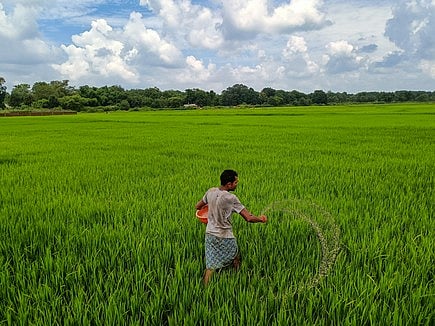From UAE to Bangladesh: How AI weather forecasts boost farming
Abu Dhabi’s MBZUAI, global partners train officials to support farmers

Governments in low- and middle-income countries are getting a cutting-edge boost in weather prediction, thanks to a first-of-its-kind, AI-powered weather forecasting training programme.
The pioneering initiative, funded by a grant provided by the International Affairs Office at the Presidential Court of the UAE, was launched recently by the Mohamed bin Zayed University of Artificial Intelligence (MBZUAI) in collaboration with Agricultural Innovation Mechanism for Scale (AIM for Scale) and the University of Chicago.
The programme is training staff from national meteorological and hydrological services (NMHS) and ministries of agriculture across low-and-middle-income countries on how to use AI weather forecasting models that are tailored to farmers’ needs. A team of researchers are ensuring that countries can adopt these innovations early and build world class national services – delivering services once limited to places like the US, EU, or Japan.
The programme is especially timely as climate change drives extreme and unpredictable weather, threatening crops and livelihoods across the globe. AI is now helping forecast these shifts faster, cheaper, and more accurately, even in regions that historically lacked access to advanced weather modelling.
Empowering farmers
The first cohort – representing Bangladesh, Chile, Ethiopia, Kenya, and Nigeria – received training last month in the UAE, hosted by MBZUAI and the National Center of Meteorology (NCM). In the years ahead, additional rounds will expand to 25 more countries – reaching a total of 30 and potentially benefitting millions more farmers.
“Accurate, high-quality forecasts can unlock better yields, higher incomes, and stronger livelihoods for farmers,” said Paul Winters, Executive Director of AIM for Scale.
“By pairing AI innovation with practical agricultural decision-making, we’re creating opportunities for millions of farmers to prosper.”
The team is engaging ministries of agriculture to ensure forecasts can be tailored to the needs of smallholder farmers who are most vulnerable to weather risks.
“From weather data to model verification and downscaling, this training covers the key dimensions of AI-powered weather forecasting that enable farmers to plan under uncertainty,” said Souhaib Ben Taieb, Associate Professor of Statistics and Data Science at MBZUAI. “It demonstrates how frontier AI research can translate into practical solutions for global challenges like food security.”
Global partnership
Experts from the World Meteorological Organisation, Google DeepMind and Google Research, the European Centre for Medium-Range Weather Forecasts (ECMWF), and others are contributing to make this programme a global standard for AI-driven forecasting.
Amir Jina, assistant professor at UChicago’s Harris School of Public Policy and Chair of AIM for Scale’s Technical Panel, said the training is a powerful example of how AI can be operationalised for the global good.
“For the first time in history, there is a real prospect of democratising access to world-leading forecasts, with low- and middle-income countries able to build national services that meet the same gold standard as the most advanced countries.”
Sign up for the Daily Briefing
Get the latest news and updates straight to your inbox
Network Links
GN StoreDownload our app
© Al Nisr Publishing LLC 2026. All rights reserved.